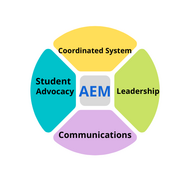
(View Complete Item Description)
Provide Accessible Educational Materials
Share:
The ability to curate and share high-quality, digital learning content is identified as an important component of a robust infrastructure and crucial to delivering engaging and relevant learning experiences based on the NETP. It is imperative that all students have equal access to digital content that is not only high-quality, but also accessible. When high-quality educational materials are designed to be accessible without retrofitting, all students have the opportunity to gain the same information, engage in the same interactions, and enjoy the same services as students without disabilities with substantially equal ease of use (Office of Civil Rights).
Actions to support access to accessible learning materials include:
Select a learning management system that includes accessibility features and its own accessibility checker.
Provide accessibility tools as an option for all educators and students to support individual learner needs and preferences (screen readers, dictation, or video tools).
Choose accessible educational materials so all students may “acquire the same information, engage in the same interactions, and enjoy the same services.” (Joint Letter US Department of Justice and US Department of Education, June 29, 2010).
Material Type:
Primary Source
Author:
CAST: Center on Inclusive Technology and Education Systems



















